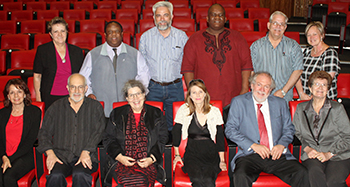Latest News Archive
Please select Category, Year, and then Month to display items
02 January 2025
|
Story Gerda-Marie van Rooyen
|
Photo Supplied
 Leading the research in South Africa is Prof Linus Franke from the Department of Soil, Crop and Climate Sciences.
Leading the research in South Africa is Prof Linus Franke from the Department of Soil, Crop and Climate Sciences.
Scientists are actively pursuing the successful breeding of diploid hybrid potatoes from inbred lines. This is expected to revolutionise potato breeding as it holds the key to rapid genetic progress. It will introduce new varieties for commercialisation through seed. Currently, existing potato variants have a gene that renders self-pollinated seeds infertile.
Prof Linus Franke, an academic in the Department of Soil, Crop and Climate Sciences at the UFS, is leading the research in South Africa. “This technology allows the production of genetically uniform potato seed that is easy to transport and largely disease-free.” He says this differs from conventional breeding whereby only vegetative propagation is possible due to tetraploid varieties in potatoes. It also risks carrying pests and diseases from one generation to the next – leading to the accumulation of pests and diseases with each round of multiplication.
Seed innovation
Prof Franke explains that Solynta BV, a seed company based in the Netherlands that produces potato varieties that can be grown from seed, has included South Africa in their research efforts because it is one of Africa’s largest producers and exporters. Through his academic relationship with Wageningen University and Research, a Dutch institution renowned for its agricultural endeavours and food production, the UFS became involved in researching hybrid potatoes grown from seed.
Diploid seeds containing two sets of chromosomes allow easier gene manipulation to increase predictability and speedier genetic progress. The breeding approach enables the incorporation of tolerance to pests, diseases, abiotic stresses (cold, heat, drought) and other desired genetic traits.
Although Prof Franke is optimistic about this research, he is not blind to disadvantages. “Potato seeds are tiny and have little energy reserves, making it harder to grow potatoes from seed than from tubers.” He says potatoes from seed will take longer to cultivate than tubers, as farmers need to grow plantlets from seeds first, adding six weeks to the growing period. “It is possible that commercial farmers can grow potatoes directly from seed. Alternatively, perhaps more likely, specialised growers will produce tubers of potatoes from seed; these tubers are then sold as seed tubers to other potato farmers, who then continue their normal practices of producing potatoes for the market from tubers.”
Financial benefits
Prof Franke says farmers have reason to get excited. “Seed potatoes will reduce input costs, as varieties with enhanced tolerance to pests and diseases require less pesticides. Planting one hectare of potatoes requires three to four tonnes of potato tubers, but only one 25 g packet of potato seeds.” Since potatoes are a more valuable commodity than maize, this technology might also increase farmers’ income potential.
Special Edition of the Journal for New Generation Sciences launched at UFS
2016-10-26

Participants of the round-table discussion
at the launch of the Journal for New Generation
Sciences during the UFS Faculty of Education
colloquium which took place on 20 October 2016.
Photo: Oteng Mpete
The Journal for New Generation Sciences Special Edition was launched on 20 October 2016, at the Albert Wessels Auditorium, during the University of the Free State’s (UFS) Faculty of Education colloquium on the field of technological higher education and its contribution to the knowledge society.
Partnerships and knowledge production
Prof Laetus Lategan, Dean of Research and Innovation at the Central University of Technology (CUT), led the launch. “Higher education is not only about producing knowledge but it is also about fostering new relationships,” said Prof Lategan referring to CUT’s collaboration with the UFS Faculty of Education.
“Empowering people is important for capacity building, offering novice writers the opportunity to learn and a way to enhance their academic writing,” said Prof Lategan.
The Journal for New Generation Sciences is an accredited research publication in which scholars, internal and external to the institution, may publish. It accommodates national and international publications and showcases the university’s commitment to applied research.
Growing in leaps and bounds
According to Dr Somarie Holtzhausen, from the Faculty of Education’s School of Higher Education Studies, all papers are peer-reviewed by at least two experts. An editorial review also secures the quality of the paper. In 2014, when the journal was established, 30 contributions were submitted, although only 25 were successfully published.
“We turn down content not because it is not good, but unfortunately because it does not speak to the heart of the journal,” said Prof Lategan. With 60 peer reviewers, the journal’s contributors are assured that at least two peer reviewers will assess their article.
The Journal for New Generation Sciences supports both high-quality scholarly work of established researchers, and capacity building among new researchers.
During the round-table discussion various contributors to the journal spoke about their research and involvement in the publication of the journal.